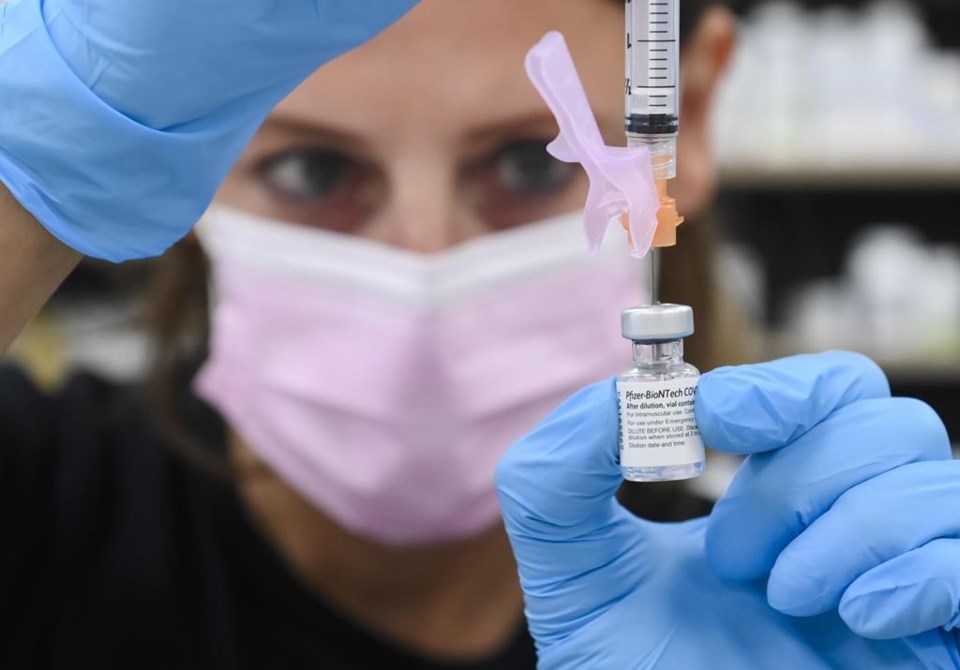TORONTO — COVID-19 vaccination certificates would allow high-risk settings to reopen sooner with greater capacity and help plan for future waves of the virus, Ontario's science advisors say.
The group of experts wrote this week that proof-of-vaccination certificates would also help set up infrastructure to guide the reintroduction of public health measures if cases spike in the future.
"COVID-19 vaccine certificates may have a practical short-term utility for supporting and maintaining economic and societal reopening," the group wrote. "In the longer-term, vaccine certificates may be useful as verifiable, secure, standardized, and accessible electronic or paper records of immunization."
To prepare the brief, the group looked at jurisdictions that have introduced similar systems around the world to consider what role the certificates might play in Ontario, if introduced.
Ontario currently provides paper and electronic vaccine receipts, but Premier Doug Ford has said he won’t introduce a proof-of-vaccination system.
"We aren’t going to have a split society," Ford told reporters last week when asked about the domestic "vaccine passport" concept that's been floated in other provinces.
The science table notes that ethical considerations should be weighed when considering a vaccine certificate system.
Their report differentiates between vaccine passports, which relate to travel across jurisdictions, and vaccine certificates, an official document attesting someone has completed a vaccination series.
"The terms are often used interchangeably but have very different meanings and potential uses," the brief said.
They said vaccine certificates could be applied to regulate entry into high-risk settings for transmission, like indoor dining, bars, gyms and events. The certificates could also be used in settings like schools, universities, congregate settings and workplaces, they wrote, "especially in settings that require mandatory vaccination."
Most public settings and businesses have partially reopened with capacity limits and masking rules under the current stage of Ontario's reopening plan. The province has said 80 of eligible residents will need to have received at least one shot before public health rules are relaxed further.
Eighty per cent of Ontario adults have at least one dose of a COVID-19 vaccine and 64 per cent are fully vaccinated. The rate is lower among youth 12 and up, with 63 per cent of that age band vaccinated with one dose.
The report also said that in the long-term, the certificates could serve as a secure record of immunization.
It said some Ontario postsecondary institutions have already said students living on campus will need to be fully vaccinated against COVID-19 this fall, and a vaccination certificate could be used as verifiable proof of immunization.
The science table's report says the certificates have been used in some jurisdictions to incentivize vaccination, though it notes there's no evidence linking the impact of vaccine certificates to vaccine coverage or virus transmission.
The group cautions, however, that privacy and equity concerns will need to be considered before a certificate system is implemented.
"Governments and health authorities have a role in ensuring that necessary regulations are in place to ensure that vaccine certificates are created and used in a way that safeguards human rights, enables individual accommodations when warranted ... and protect against misuse," they wrote.
Ontario reported 185 new cases of COVID-19 on Thursday and seven more deaths.
Grey Bruce saw 22 of the new cases, with another 18 in Toronto, 17 in Hamilton, 13 in Peel Region and 13 in the Region of Waterloo. There were almost 19,600 tests completed in the previous day.
There are 141 people in intensive care in hospitals due to COVID-related critical illness and 84 patients are on ventilators.
This report by The Canadian Press was first published July 22, 2021.
Holly McKenzie-Sutter, The Canadian Press

